349 start with E start with E
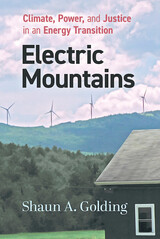
Committed environmentalists in one of North America’s most progressive regions desperately wanted energy policies that address the climate crisis. For many of them, wind turbines on Northern New England’s iconic ridgelines symbolize the energy transition that they have long hoped to see. For others, however, ridgeline wind takes on a very different meaning. When weighing its costs and benefits locally and globally, some wind opponents now see the graceful structures as symbols of corrupted energy politics.
This book derives from several years of research to make sense of how wind turbines have so starkly split a community of environmentalists, as well as several communities. In doing so, it casts a critical light on the roadmap for energy transition that Northern New England’s ridgeline wind projects demarcate. It outlines how ridgeline wind conforms to antiquated social structures propping up corporate energy interests, to the detriment of the swift de-carbonizing and equitable transformation that climate predictions warrant. It suggests, therefore, that the energy transition of which most of us are a part, is probably not the transition we would have designed ourselves, if we had been asked.
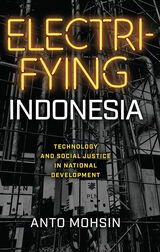
In this innovative volume, Anto Mohsin brings Indonesian studies together with science and technology studies to understand a crucial period in modern Indonesian history. He shows that attempts to illuminate the country were inseparable from the effort to maintain the new nation-state, chart its path to independence, and legitimize ruling regimes. In exchange for an often dramatically improved standard of living, people gave their votes, and their acquiescence, to the ruling government.
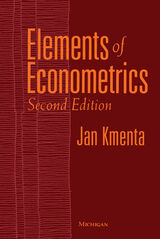
Throughout the book the emphasis is on simplification whenever possible, assuming the readers know college algebra and basic calculus. Jan Kmenta explains all methods within the simplest framework, and generalizations are presented as logical extensions of simple cases. And while a relatively high degree of rigor is preserved, every conflict between rigor and clarity is resolved in favor of the latter. Apart from its clear exposition, the book's strength lies in emphasizing the basic ideas rather than just presenting formulas to learn and rules to apply.
The book consists of two parts, which could be considered jointly or separately. Part one covers the basic elements of the theory of statistics and provides readers with a good understanding of the process of scientific generalization from incomplete information. Part two contains a thorough exposition of all basic econometric methods and includes some of the more recent developments in several areas.
As a textbook, Elements of Econometrics is intended for upper-level undergraduate and master's degree courses and may usefully serve as a supplement for traditional Ph.D. courses in econometrics. Researchers in the social sciences will find it an invaluable reference tool.
A solutions manual is also available for teachers who adopt the text for coursework.
Jan Kmenta is Professor Emeritus of Economics and Statistics, University of Michigan.

The odyssey of 600,000 imperial Japanese soldiers incarcerated in Soviet labor camps after World War II and their fraught repatriation to postwar Japan.
In August 1945 the Soviet Union seized the Japanese puppet state of Manchukuo and the colony of Southern Sakhalin, capturing more than 600,000 Japanese soldiers, who were transported to labor camps across the Soviet Union but primarily concentrated in Siberia and the Far East. Imprisonment came as a surprise to the soldiers, who thought they were being shipped home.
The Japanese prisoners became a workforce for the rebuilding Soviets, as well as pawns in the Cold War. Alongside other Axis POWs, they did backbreaking jobs, from mining and logging to agriculture and construction. They were routinely subjected to “reeducation” glorifying the Soviet system and urging them to support the newly legalized Japanese Communist Party and to resist American influence in Japan upon repatriation. About 60,000 Japanese didn’t survive Siberia. The rest were sent home in waves, the last lingering in the camps until 1956. Already laid low by war and years of hard labor, returnees faced the final shock and alienation of an unrecognizable homeland, transformed after the demise of the imperial state.
Sherzod Muminov draws on extensive Japanese, Russian, and English archives—including memoirs and survivor interviews—to piece together a portrait of life in Siberia and in Japan afterward. Eleven Winters of Discontent reveals the real people underneath facile tropes of the prisoner of war and expands our understanding of the Cold War front. Superpower confrontation played out in the Siberian camps as surely as it did in Berlin or the Bay of Pigs.

The poignant rise and fall of an idealistic immigrant who, as CEO of a major conglomerate, tried to change the way America did business before he himself was swallowed up by corporate corruption.
At 8 a.m. on February 3, 1975, Eli Black leapt to his death from the 44th floor of Manhattan’s Pan Am building. The immigrant-turned-CEO of United Brands—formerly United Fruit, now Chiquita—Black seemed an embodiment of the American dream. United Brands was transformed under his leadership—from the “octopus,” a nickname that captured the corrupt power the company had held over Latin American governments, to “the most socially conscious company in the hemisphere,” according to a well-placed commentator. How did it all go wrong?
Eli and the Octopus traces the rise and fall of an enigmatic business leader and his influence on the nascent project of corporate social responsibility. Born Menashe Elihu Blachowitz in Lublin, Poland, Black arrived in New York at the age of three and became a rabbi before entering the business world. Driven by the moral tenets of his faith, he charted a new course in industries known for poor treatment of workers, partnering with labor leaders like Cesar Chavez to improve conditions. But risky investments, economic recession, and a costly wave of natural disasters led Black away from the path of reform and toward corrupt backroom dealing.
Now, two decades after Google’s embrace of “Don’t be evil” as its unofficial motto, debates about “ethical capitalism” are more heated than ever. Matt Garcia presents an unvarnished portrait of Black’s complicated legacy. Exploring the limits of corporate social responsibility on American life, Eli and the Octopus offers pointed lessons for those who hope to do good while doing business.
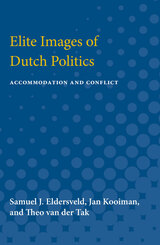
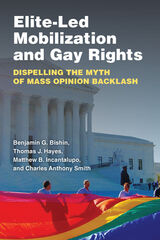
Media and scholastic accounts describe a strong public opinion backlash—a sharply negative and enduring opinion change—against attempts to advance gay rights. Academic research, however, increasingly questions backlash as an explanation for opposition to LGBT rights. Elite-Led Mobilization and Gay Rights argues that what appears to be public opinion backlash against gay rights is more consistent with elite-led mobilization—a strategy used by anti-gay elites, primarily white evangelicals, seeking to prevent the full incorporation of LGBT Americans in the polity in order to achieve political objectives and increase political power. This book defines and tests the theory of Mass Opinion Backlash and develops and tests the theory of Elite-Led Mobilization by employing a series of online and natural experiments, surrounding the U.S. Supreme Court rulings in Obergefell v. Hodges and United States v. Windsor, and President Obama’s position change on gay marriage. To evaluate these theories, the authors employ extensive survey, voting behavior, and campaign finance data, and examine the history of the LGBT movement and its opposition by religious conservatives, from the Lavender Scare to the campaign against Trans Rights in the defeat of Houston’s 2015 HERO ordinance. Their evidence shows that opposition to LGBT rights is a top-down process incited by anti-gay elites rather than a bottom-up reaction described by public opinion backlash.
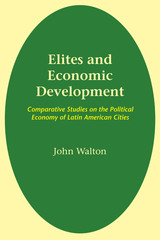
This book is a detailed comparative analysis of development politics in four urban regions of Latin America, two in Mexico and two in Colombia. John Walton has based his studies on the assumption that the problems of economic growth are essentially political, that is, are problems of choice, decision-making, and the exercise of power. His fundamental purpose has been to discover how elites of different kinds are more and less successful in the promotion of economic development, which he defines as a process in the organization of a society leading not only to higher levels of efficient output but also to a more equitable distribution of benefits.
At the time, the four cities compared were the second- and third-largest metropolitan areas in each country, Guadalajara and Monterrey in Mexico, Medellín and Cali in Colombia. This selection allows the author to pair, across countries, cases of early and large-scale industrialization (Monterrey and Medellín) with cases of more recent industrial growth in agricultural-commercial centers (Guadalajara and Cali). Walton presents historical introductions to each of the regions and integrates these with original fieldwork and interviews with more than three hundred members of the political and economic elites.
The findings are extensive, but in general they demonstrate that where political and economic power is more broadly distributed, where elites are more open and accessible, and where organizational life is more active and coordinated, regions tend to develop qualitatively as well as quantitatively, showing increases both in productivity and in such benefits as public services, housing, education, and a more balanced distribution of income. If these characteristics are absent, regions may be industrialized but do not provide a broad sharing of the benefits. Walton places a good deal of emphasis on the role of foreign investments, demonstrating that the more penetrated regions are also the less developed.
Finally, the results of these studies are used to evaluate and advance theories of underdevelopment and particularly of economic dependency.
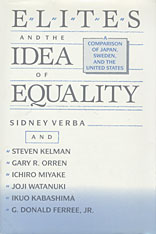
What equality means in three modern democracies, both to leaders of important groups and to challengers of the status quo, is the subject of this wide-ranging canvass of perceptions and policy. It is based on extensive questionnaire data gathered from leaders in various segments of society in each countrybusiness, labor unions, farm organizations, political parties, the media-as well as from groups that are seeking greater equalityfeminists, black leaders in the United States, leaders of the Burakumin in Japan. The authors describe the extent to which the same meanings of equality exist, both within and across nations, and locate the areas of consensus and conflict over equality. No other book has compared data of this sort for these purposes.
The authors address several major substantive and theoretical issues: the role of values in relation to egalitarian outcomes; the comparison of values and perceptions about equality in economics (income equality) and politics (equality of influence); and the difference among the nations in the ways political institutions affect the incorporation of new demands for equality into the policymaking process. They pay particular attention to how policy is set on issues of gender equality.
This book will be controversial, for some see no room in the understanding of political economy for the analysis of values. It will be consulted by a general audience interested in politics and culture as well as by social scientists. Elites and the Idea of Equality is an informative sequel to Equality in America by Sidney Verba and Gary R. Orren (Harvard University Press), which considers similar topics in a national context.

In this timely addition to the Ohio Short Histories of Africa series, Pamela Scully takes us from the 1938 birth of Nobel Peace Prize winner and two-time Liberian president Ellen Johnson through the Ebola epidemic of 2014–15. Charting her childhood and adolescence, the book covers Sirleaf’s relationship with her indigenous grandmother and urban parents, her early marriage, her years studying in the United States, and her career in international development and finance, where she developed her skill as a technocrat. The later chapters cover her years in and out of formal Liberian politics, her support for women’s rights, and the Ebola outbreak.
Sirleaf’s story speaks to many of the key themes of the twenty-first century. Among these are the growing power of women in the arenas of international politics and human rights; the ravaging civil wars in which sexual violence is used as a weapon; and the challenges of transitional justice in building postconflict societies. Ellen Johnson Sirleaf is an astute examination of the life of a pioneering feminist politician.

"A magisterially written, well-researched, informative, and entertaining biography of a woman who helped throw open the doors to broader participation and power for women in the Republican Party and American politics."
---Dave Dempsey, author of William G. Milliken: Michigan's Passionate Moderate
"Elly Peterson will be a text to which historians and researchers turn for insight into the yin and yang of mainstream politics in the mid-century."
---Patricia Sullivan, past president, Journalism and Women Symposium
"This lively portrait of a leading woman in the Republican Party between 1952 and 1982 also charts the party's shift to the right after 1964, revealingly viewed through the eyes of liberal Republican women. Intensively researched with ethnographic attention to the subtleties of political culture, Fitzgerald's book is essential reading for anyone interested in how the Republican Party changed during the turbulent decades after 1960 and how women and women's issues shaped those changes."
---Kathryn Kish Sklar, Distinguished Professor of History, State University of New York, Binghamton
"Sara Fitzgerald tells Peterson's story in this superb and timely biography. It carries a message that deserves the widest audience as the nation struggles to find needed consensus on critical issues amid poisonous political partisanship that has made it increasingly difficult for public officials to bridge their differences. I hope that every American reads it."
---Pulitzer Prize winner Haynes Johnson, from the Foreword
"To understand the quest for equal rights in America you really need to meet those women who were active at the time of transition. In this gripping biography we meet one woman who entered a male dominated world and triumphed."
---Francis X. Blouin Jr., Director, Bentley Historical Library
"Sara Fitzgerald's writing is as intelligent as it is entertaining."
---Best-selling novelist Diane Chamberlain
Elly Peterson was one of the highest ranking women in the Republican Party. In 1964 she ran for a Michigan seat in the U.S. Senate and became the first woman to serve as chair of the Michigan Republican Party. During the 1960s she grew disenchanted with the increasing conservatism of her party, united with other feminists to push for the Equal Rights Amendment and reproductive choice, battled Phyllis Schlafly to prevent her from gaining control of the National Federation of Republican Women, and became an independent.
Elly Peterson's story is a missing chapter in the political history of Michigan, as well as the United States. This new biography, written by Sara Fitzgerald (a Michigan native and former Washington Post editor), finally gives full credit to one of the first female political leaders in this country.
When Peterson resigned in 1970 as assistant chairman of the Republican National Committee, David Broder of the Washington Post wrote that "her abilities would have earned her the national chairmanship, were it not for the unwritten sex barrier both parties have erected around that job."

As World War I dragged on into 1915, German armies along the Western Front settled into stalemate with entrenched British and French forces. But in the East the picture was quite different. The Kaiser’s army routed the Russians, took possession of Polish territory, and attempted to create a Polish satellite state. Elusive Alliance delves into Germany’s three-year occupation of Poland and explains why its ambitious attempt at nation-building failed.
Dubbed the Imperial Government-General of Warsaw, Germany’s occupation regime was headed by veteran Prussian commander Hans Hartwig von Beseler. In his vision for Central Europe, Poland would become Germany’s permanent ally, culturally and politically autonomous but bound to the Fatherland in foreign policy matters. To win Polish support, Beseler spearheaded the creation of new institutions including a Polish-language university in Warsaw, reformed the school system, and established democratically elected municipal governments. For Beseler and other German strategists, a secure Poland was essential to ensuring Central Europe against a threatening tide of nationalism and revolution.
But as Jesse Kauffman shows, Beseler underestimated the resistance to his policies and the growing hostility to occupation as Germany plundered Polish resources to fuel its war effort. By 1918, with the war over, Poles achieved independence. Yet it would not be long before they faced a second, far more brutal German occupation at the hands of the Nazis.

An ambitious study that spans more than thirty years and covers all facets of educational policy, from legal battles to tax strategies, The Elusive Ideal provides a model from which future inquiries will proceed. A probing and provocative work of urban history with deep relevance for urban public schools today, Nelson's book reveals why equal educational opportunity remains such an elusive ideal.

Drawing on decades of research, Elusive Justice demonstrates how these women continue to face numerous adverse circumstances, including geographical isolation, encroaching capitalist enterprises, and a dearth of social and institutional support. Donny Meertens contends that women's advocacy organizations must have a prominent role in overseeing these transitional policies in order to create a more just society. By bringing together the underresearched topic of property repayment and the pursuit of gender justice in peacebuilding, these findings have broad significance elsewhere in the world.
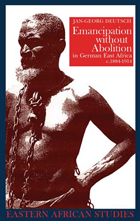
This study examines the complex history of slavery in East Africa, focusing on the area that came under German colonial rule. In contrast to the policy pursued at the time by other colonial powers in Africa, the German authorities did not legally abolish slavery in their colonial territories. However, despite government efforts to keep the institution of slavery alive, it significantly declined in Tanganyika in the period concerned. The book highlights the crucial role played by the slaves in the process of emancipation.
Author Jan-Georg Deutsch explores the rise of slavery in Tanganyika in the second half of the nineteenth century, when the region became more fully integrated into the world economy.
An analysis of German colonial policy reveals that the authorities believed that abolition should be avoided at all costs since it would undermine the power and prosperity of the local slave-owning elites whose effective collaboration was thought to be indispensable to the functioning of colonial rule.
The author demonstrates how slaves by their own initiative brought the ”evil institution“ to an end, making the best of limited choices and opportunities available to them.
The study, of interest to historians of East Africa, makes a contribution to the more general debate about the demise of slavery on the continent.
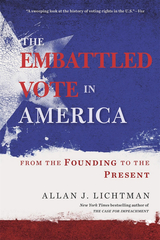
“A sweeping look at the history of voting rights in the U.S.”—Vox
Who has the right to vote? And who benefits from exclusion?
For most of American history, the right to vote has been a privilege restricted by wealth, sex, race, and literacy. Economic qualifications were finally eliminated in the nineteenth century, but the ideal of a white man’s republic persisted long after that. Women and racial minorities had to fight hard and creatively to secure their voice, but voter identification laws, registration requirements, and voter purges continue to prevent millions of American citizens from voting.
An award-winning historian and voting right activist, Allan Lichtman gives us the history behind today’s headlines. He shows that political gerrymandering and outrageous attempts at voter suppression have been a fixture of American democracy—but so have efforts to fight back and ensure that every citizen’s voice be heard.
“Lichtman uses history to contextualize the fix we’re in today. Each party gropes for advantage by fiddling with the franchise… Growing outrage, he thinks, could ignite demands for change. With luck, this fine history might just help to fan the flame.”
—New York Times Book Review
“The great value of Lichtman’s book is the way it puts today’s right-wing voter suppression efforts in their historical setting. He identifies the current push as the third crackdown on African-American voting rights in our history.”
—Michael Tomasky, New York Review of Books
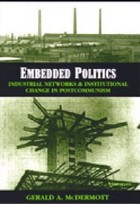
Using comparative case analysis of several manufacturing sectors, Embedded Politics accounts for change and continuity in the formation of new economic governance institutions in the Czech Republic. It analytically links the macropolitics of state policy with the micropolitics of industrial restructuring. Thus the book advances an alternative approach for the comparative study of institutional change and industrial adjustment.
As a historical and contemporary analysis of Czech firms and public institutions, this book will command the attention of students of postcommunist reforms, privatization, and political-economic transitions in general. But also given its interdisciplinary approach and detailed empirical analysis of policy-making and firm behavior, Embedded Politics is a must read for scholars of politics, economics, sociology, political economy, business organization, and public policy.
Gerald A. McDermott is Assistant Professor of Management in The Wharton School of Management at The University of Pennsylvania. His research applies recent advances in comparative political economy and industrial organization, including theories of social networks, historical institutionalism, and incomplete markets to analyze issues of economic governance, firm creation, and industrial restructuring in advanced and newly industrialized countries. As evidenced by Embedded Politics, his current focus is on problems of institutional and organizational learning in the formation of meso-level governance institutions in emerging market and postsocialist economies.
McDermott also works as Senior Research Fellow at the IAE Escuela de Direccion y Negocios at Universidad Austral in Buenos Aires, and he has served as Project Coordinator at the Inter-American Development Bank. He has consulted for the Finance, Private Sector, and Infrastructure Division at the World Bank and advised the Deputy Foreign Minister of the Czech Republic. In addition he has published many papers and book chapters on entrepreneurship, privatization, institutions, and networks in Central Europe and Latin America.

Enriched by case studies of the organizations and decision making processes in several major U.S. watersheds (the Delaware River Basin, San Gabriel River, Platte River, and the Columbia River Basin), Embracing Watershed Politics presents a reasoned explanation of why there are so few watershed-scale integrated management agencies and how the more diverse multi-organizational arrangements found in the vast majorities of watersheds work. Although the presence of multiple organizations representing a multitude of communities of interest complicates watershed management, these institutional arrangements can-under certain conditions-suit the complexity and uncertainty associated with watershed management in the twenty-first century.

Too tiny to see with the naked eye, the human embryo was just a hypothesis until the microscope made observation of embryonic development possible. This changed forever our view of the minuscule cluster of cells that looms large in questions about the meaning of life. Embryos under the Microscope examines how our scientific understanding of the embryo has evolved from the earliest speculations of natural philosophers to today’s biological engineering, with its many prospects for life-enhancing therapies. Jane Maienschein shows that research on embryos has always revealed possibilities that appear promising to some but deeply frightening to others, and she makes a persuasive case that public understanding must be informed by up-to-date scientific findings.
Direct observation of embryos greatly expanded knowledge but also led to disagreements over what investigators were seeing. Biologists confirmed that embryos are living organisms undergoing rapid change and are not in any sense functioning persons. They do not feel pain or have any capacity to think until very late stages of fetal development. New information about DNA led to discoveries about embryonic regulation of genetic inheritance, as well as evolutionary relationships among species. Scientists have learned how to manipulate embryos in the lab, taking them apart, reconstructing them, and even synthesizing—practically from scratch—cells, body parts, and maybe someday entire embryos. Showing how we have learned what we now know about the biology of embryos, Maienschein changes our view of what it means to be alive.

The United States and Western Europe are experiencing a new and important cultural and political development: the appearance of a right wing extremist movement that crosses the Atlantic Ocean and transcends national boundaries with as much ease as do e-mail messages on the Internet. In this book, Jeffrey Kaplan and Leonard Weinberg argue that there now exists a set of conditions common to the United States and Western Europe that draws right wing radicals on both sides of the Atlantic closer together. These conditions, based on demographic pressures, social dislocation, economic changes, and technological advances, have set the stage for the formation of a new Euro-American radical right movement whose motives and characteristics differ from the right wing groups of the early twentieth century.
During the first thirty years of this century, radical right wing ideas and material support flowed primarily from Europe to the United States. In recent years, the inspiration for the movement has tended to flow in the opposite direction, with the establishment of various American-based groups, like the Ku Klux Klan and the White Aryan Resistance, on European soil. Kaplan and Weinberg contend that unlike their predecessors contemporary Western right wing groups develop a common identity based more on racial solidarity than on national identity. To support their argument, the authors provide a history of extreme right wing activity in the West and a comprehensive, detailed overview of major figures, groups, and characteristics that comprise the Euro-American radical right. They discuss the role of the Internet in facilitating the transatlantic community and offer personal, inside accounts of people involved in the various movements.

The start of accession talks between Turkey and the European Union presents an important challenge for Europe and the Muslim world. Although Turkey has often been cited as a model for the accommodation of Islam and secularism, Islam is still a profound factor in Turkish politics.
This book explores the conditions under which an Islamic movement or party ceases to be Islamic. The Emergence of a New Turkey explains the social, economic, and historical origins of the ruling Justice and Development Party, which evolved from Turkey's half-century-old Islamic National Outlook movement. It focuses on the interplay between internal and external forces in the transformation of political Islam into a conservative democratic party. The book also discusses the effect of neoliberal economic policies in Turkey, offering keen insight into one of the most successful transformations of an Islamic movement in the Muslim world.
In addition to satisfying Turkish studies specialists, this lucidly written book is also suited for use in courses on comparative politics, social movements, and Middle East history and politics.
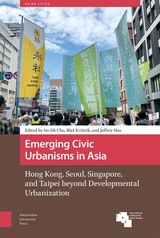

For as long as there have been nations, there has been an “international”—a sphere of cross-border relations. But for most of human history, this space was sparsely occupied. States and regions were connected by long-distance commerce and the spasms of war, yet in their development they remained essentially separate. The century after 1750 marked a major shift. Fleeting connection gave way to durable integration. Culture, politics, and society were increasingly, and indelibly, entangled across continents. An Emerging Modern World charts this transformative period, addressing major questions about the roots of the present from a distinctly global perspective.
Why, for instance, did industrialization begin in England and not in China? Was there early capitalist development outside of the West? Was the Enlightenment exclusively a European event? Led by editors Sebastian Conrad and Jürgen Osterhammel, a distinguished group of historians tackles these issues, along with the roles of nomads and enslaved people in fostering global integration, the development of a bourgeoisie outside Euro-America, Hinduism’s transformation from local practices into a universal system, the invention of pan-Islamic identity, and the causes and effects of the revolution in time regimes. The world appeared to be undergoing such a radical renewal that the impression of an epochal watershed was widespread.
This fourth volume in the six-volume series A History of the World engages the political, economic, social, and intellectual ferment of the eighteenth and nineteenth centuries outside Europe and North America. In doing so, it bears witness to the birth of the modern world.

As widespread environmental degradation threatens the basic human rights of a large proportion of the world’s population, we are also confronting the worst migration crisis in the modern era. Emerging Threats to Human Rights searches among the interrelated causes of these overlapping crises. The editor and contributors to this timely anthology assess how environmental resources, state violence, and the deprivation of nationality/citizenship are linked to gain a better understanding of how human rights abuses intersect with patterns of migration.
As some refugees flee violence at home, they arrive in an asylum country only to experience violence at the hands of the native population. Likewise, those denied citizenship rights in their country become vulnerable to human traffickers and other rights violations when they flee.
Bringing together scholars of resource dilemmas, violence, and citizenship as well as lawyers and human rights practitioners, Emerging Threats to Human Rights begins by identifying the core causes of human rights violations confronting our world today. Chapters also consider whether and to what extent these emerging threats to human rights serve as drivers of displacement.

There is an extensive body of research on protest, but the focus has mostly been on the calculating brain—a byproduct of structuralism and cognitive studies—and less on the feeling brain. James M. Jasper’s work changes that, as he pushes the boundaries of our present understanding of the social world. In The Emotions of Protest, Jasper lays out his argument, showing that it is impossible to separate cognition and emotion. At a minimum, he says, we cannot understand the Tea Party or Occupy Wall Street or pro- and anti-Trump rallies without first studying the fears and anger, moral outrage, and patterns of hate and love that their members feel.
This is a book centered on protest, but Jasper also points toward broader paths of inquiry that have the power to transform the way social scientists picture social life and action. Through emotions, he says, we are embedded in a variety of environmental, bodily, social, moral, and temporal contexts, as we feel our way both consciously and unconsciously toward some things and away from others. Politics and collective action have always been a kind of laboratory for working out models of human action more generally, and emotions are no exception. Both hearts and minds rely on the same feelings racing through our central nervous systems. Protestors have emotions, like everyone else, but theirs are thinking hearts, not bleeding hearts. Brains can feel, and hearts can think.

. . . An engaging personal account of a public service career n the period leading to the 1974 revolution. It ...persuades and provides real insight into the genuine noblesse oblige of the first generation of technocrats drawn from the social elite of the post- war period.
-James McCann, Boston University

Analyzing new evidence gathered through interviews, archival research, and Freedom of Information Act requests, Lindsay-Poland discloses the hidden history of U.S.–Panama relations, including the human and environmental toll of the massive canal building project from 1904 to 1914. In stunning detail he describes secret chemical weapons tests—of toxins including nerve agent and Agent Orange—as well as plans developed in the 1960s to use nuclear blasts to create a second canal in Panama.
He chronicles sustained efforts by Panamanians and international environmental groups to hold the United States responsible for the disposal of the tens of thousands of explosives it left undetonated on the land it turned over to Panama in 1999. In the context of a relationship increasingly driven by the U.S. antidrug campaigns, Lindsay-Poland reports on the myriad issues that surrounded Panama’s takeover of the canal in accordance with the 1977 Panama Canal Treaty, and he assesses the future prospects for the Panamanian people, land, and canal area. Bringing to light historical legacies unknown to most U.S. citizens or even to many Panamanians, Emperors in the Jungle is a major contribution toward a new, more open relationship between Panama and the United States.
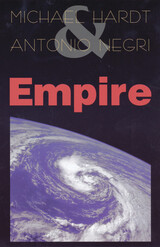
Imperialism as we knew it may be no more, but Empire is alive and well. It is, as Michael Hardt and Antonio Negri demonstrate in this bold work, the new political order of globalization. It is easy to recognize the contemporary economic, cultural, and legal transformations taking place across the globe but difficult to understand them. Hardt and Negri contend that they should be seen in line with our historical understanding of Empire as a universal order that accepts no boundaries or limits. Their book shows how this emerging Empire is fundamentally different from the imperialism of European dominance and capitalist expansion in previous eras. Rather, today’s Empire draws on elements of U.S. constitutionalism, with its tradition of hybrid identities and expanding frontiers.
Empire identifies a radical shift in concepts that form the philosophical basis of modern politics, concepts such as sovereignty, nation, and people. Hardt and Negri link this philosophical transformation to cultural and economic changes in postmodern society—to new forms of racism, new conceptions of identity and difference, new networks of communication and control, and new paths of migration. They also show how the power of transnational corporations and the increasing predominance of postindustrial forms of labor and production help to define the new imperial global order.
More than analysis, Empire is also an unabashedly utopian work of political philosophy, a new Communist Manifesto. Looking beyond the regimes of exploitation and control that characterize today’s world order, it seeks an alternative political paradigm—the basis for a truly democratic global society.

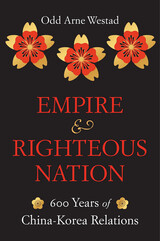
From an award-winning historian, a concise overview of the deep and longstanding ties between China and the Koreas, providing an essential foundation for understanding East Asian geopolitics today.
In a concise, trenchant overview, Odd Arne Westad explores the cultural and political relationship between China and the Koreas over the past 600 years.
Koreans long saw China as a mentor. The first form of written Korean employed Chinese characters and remained in administrative use until the twentieth century. Confucianism, especially Neo-Confucian reasoning about the state and its role in promoting a virtuous society, was central to the construction of the Korean government in the fourteenth century. These shared Confucian principles were expressed in fraternal terms, with China the older brother and Korea the younger. During the Ming Dynasty, mentor became protector, as Korea declared itself a vassal of China in hopes of escaping ruin at the hands of the Mongols. But the friendship eventually frayed with the encroachment of Western powers in the nineteenth century. Koreans began to reassess their position, especially as Qing China seemed no longer willing or able to stand up for Korea against either the Western powers or the rising military threat from Meiji Japan. The Sino-Korean relationship underwent further change over the next century as imperialism, nationalism, revolution, and war refashioned states and peoples throughout Asia. Westad describes the disastrous impact of the Korean War on international relations in the region and considers Sino-Korean interactions today, especially the thorny question of the reunification of the Korean peninsula.
Illuminating both the ties and the tensions that have characterized the China-Korea relationship, Empire and Righteous Nation provides a valuable foundation for understanding a critical geopolitical dynamic.

“The relationship between China and Korea is one of the most important, and least understood, in Asia. With the wisdom and clarity we have come to expect from Westad, this book illuminates the long history of these two neighbors.”
—Rana Mitter, author of China’s Good War
“A timely must-read primer on the China–Korea relationship…and its impact on and implications for our world today.”
—Carter J. Eckert, author of Park Chung Hee and Modern Korea
“Valuable and wide-ranging…As two thousand years of history have shown, China’s role in Korea is a complex one. Westad’s short and stimulating study provides many clues to understanding that relationship.”
—J. E. Hoare, Literary Review
“An insightful and entertaining primer on Korean history over the last 600 years.”
—Popular History Books
Koreans long saw China as a mentor and protector. Chinese culture heavily influenced Korea, whose first written language used Chinese characters, while Confucianism shaped the structure of Korean government. This deep, sometimes fraught, relationship has done more to shape the politics of the region than many realize.
During the Ming Dynasty, Korea agreed to become a vassal of China, in hopes of escaping ruin at the hands of the Mongols. The connection frayed in the nineteenth century, when the Qing, beset by domestic problems, did little to protect Korea from encroaching Western powers or the imperial designs of Meiji Japan. The relationship shifted again in the twentieth century as nationalism, revolution, and war refashioned Asia. Odd Arne Westad lays bare the disastrous impact of the Korean War on the region and offers a keen assessment of Sino–Korean interactions today, including the thorny question of reunification.

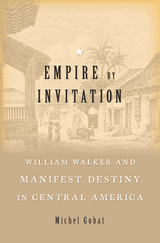
Michel Gobat traces the untold story of the rise and fall of the first U.S. overseas empire to William Walker, a believer in the nation’s manifest destiny to spread its blessings not only westward but abroad as well.
In the 1850s Walker and a small group of U.S. expansionists migrated to Nicaragua determined to forge a tropical “empire of liberty.” His quest to free Central American masses from allegedly despotic elites initially enjoyed strong local support from liberal Nicaraguans who hoped U.S.-style democracy and progress would spread across the land. As Walker’s group of “filibusters” proceeded to help Nicaraguans battle the ruling conservatives, their seizure of power electrified the U.S. public and attracted some 12,000 colonists, including moral reformers. But what began with promises of liberation devolved into a reign of terror. After two years, Walker was driven out.
Nicaraguans’ initial embrace of Walker complicates assumptions about U.S. imperialism. Empire by Invitation refuses to place Walker among American slaveholders who sought to extend human bondage southward. Instead, Walker and his followers, most of whom were Northerners, must be understood as liberals and democracy promoters. Their ambition was to establish a democratic state by force. Much like their successors in liberal-internationalist and neoconservative foreign policy circles a century later in Washington, D.C., Walker and his fellow imperialists inspired a global anti-U.S. backlash. Fear of a “northern colossus” precipitated a hemispheric alliance against the United States and gave birth to the idea of Latin America.


“A landmark book…[a] bold reframing of the history of the British Empire.”
—Caroline Elkins, Foreign Affairs
An award-winning historian places the corporation—more than the Crown—at the heart of British colonialism, arguing that companies built and governed global empire, raising questions about public and private power that were just as troubling four hundred years ago as they are today.
Across four centuries, from Ireland to India, the Americas to Africa and Australia, British colonialism was above all the business of corporations. Corporations conceived, promoted, financed, and governed overseas expansion, making claims over territory and peoples while ensuring that British and colonial society were invested, quite literally, in their ventures. Colonial companies were also relentlessly controversial, frequently in debt, and prone to failure. The corporation was well-suited to overseas expansion not because it was an inevitable juggernaut but because, like empire itself, it was an elusive contradiction: public and private; person and society; subordinate and autonomous; centralized and diffuse; immortal and precarious; national and cosmopolitan—a legal fiction with very real power.
Breaking from traditional histories in which corporations take a supporting role by doing the dirty work of sovereign states in exchange for commercial monopolies, Philip Stern argues that corporations took the lead in global expansion and administration. Whether in sixteenth-century Ireland and North America or the Falklands in the early 1980s, corporations were key players. And, as Empire, Incorporated makes clear, venture colonialism did not cease with the end of empire. Its legacies continue to raise questions about corporate power that are just as relevant today as they were 400 years ago.
Challenging conventional wisdom about where power is held on a global scale, Stern complicates the supposedly firm distinction between private enterprise and the state, offering a new history of the British Empire, as well as a new history of the corporation.
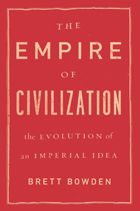
The term “civilization” comes with considerable baggage, dichotomizing people, cultures, and histories as “civilized”—or not. While the idea of civilization has been deployed throughout history to justify all manner of interventions and sociopolitical engineering, few scholars have stopped to consider what the concept actually means. Here, Brett Bowden examines how the idea of civilization has informed our thinking about international relations over the course of ten centuries.
From the Crusades to the colonial era to the global war on terror, this sweeping volume exposes “civilization” as a stage-managed account of history that legitimizes imperialism, uniformity, and conformity to Western standards, culminating in a liberal-democratic global order. Along the way, Bowden explores the variety of confrontations and conquests—as well as those peoples and places excluded or swept aside—undertaken in the name of civilization. Concluding that the “West and the rest” have more commonalities than differences,this provocative and engaging bookultimately points the way toward an authentic intercivilizational dialogue that emphasizes cooperation over clashes.

Drawing on theorists including Michel Foucault, Giorgio Agamben, Michael Hardt, Antonio Negri, and Achille Mbembe, Martin illuminates a frightening financial logic that must be understood in order to be countered. Martin maintains that finance divides the world between those able to avail themselves of wealth opportunities through risk taking (investors) and those who cannot do so, who are considered “at risk.” He contends that modern-day American imperialism differs from previous models of imperialism, in which the occupiers engaged with the occupied to “civilize” them, siphon off wealth, or both. American imperialism, by contrast, is an empire of indifference: a massive flight from engagement. The United States urges an embrace of risk and self-management on the occupied and then ignores or dispossesses those who cannot make the grade.


From the flights of the Wright brothers through the mass journeys of the jet age, airplanes inspired Americans to reimagine their nation’s place within the world. Now, Jenifer Van Vleck reveals the central role commercial aviation played in the United States’ rise to global preeminence in the twentieth century. As U.S. military and economic influence grew, the federal government partnered with the aviation industry to carry and deliver American power across the globe and to sell the very idea of the “American Century” to the public at home and abroad.
Invented on American soil and widely viewed as a symbol of national greatness, the airplane promised to extend the frontiers of the United States “to infinity,” as Pan American World Airways president Juan Trippe said. As it accelerated the global circulation of U.S. capital, consumer goods, technologies, weapons, popular culture, and expertise, few places remained distant from the influence of Wall Street and Washington. Aviation promised to secure a new type of empire—an empire of the air instead of the land, which emphasized access to markets rather than the conquest of territory and made the entire world America’s sphere of influence.
By the late 1960s, however, foreign airlines and governments were challenging America’s control of global airways, and the domestic aviation industry hit turbulent times. Just as the history of commercial aviation helps to explain the ascendance of American power, its subsequent challenges reflect the limits and contradictions of the American Century.

Leading writer Boris Kagarlitsky offers an ambitious account of 1000 years of Russian history. Encompassing all key periods in Russia's dramatic development, the book covers everything from early settlers, through medieval decline, Ivan the Terrible - the 'English Tsar', Peter the Great, the Crimean War and the rise of capitalism, the revolution, the Soviet period, finally ending with the return of capitalism after 1991.
Setting Russia within the context of the 'World System', as outlined by Wallerstein, this is a major work of historical Marxist theory that is set to become a future classic.
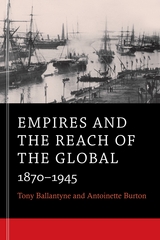
Empires and the Reach of the Global brings the history of empires into sharp focus by showing how imperialism has been a shaping force not just in international politics but in the economies and cultures of today’s world. Focusing on both the strengths and limits of imperial power, Tony Ballantyne and Antoinette Burton describe the creation and disintegration of the reigning world order in the period from 1870 to 1945.
Using the British, Japanese, and Ottoman empires as case studies, the authors trace the communication, transportation, and economic networks that were instrumental to empire building. They highlight the role of empires as place-making regimes that organize geographic space as distinct territories. Militaries and missionaries, workplaces and households, all served as key domains of interaction within these territories, as colonial officials sought to manage the customs and lifeways of indigenous populations. Imperial connections contributed to the shrinking of time and space, but colonial encroachments also provoked opposition, which often played out in locations of everyday activity, from fields and factories to schools and prisons. Colonized territories sponsored a variety of forms of organized resistance, with full-fledged nationalist movements erupting onto the global scene in the interwar period.
Ballantyne and Burton stress that empire was not something fabricated in European capitals and implemented “out there.” Rather, imperial systems, with their many racial, gendered, and economic forms, affected empires in all of their parts—the metropole as well as the farthest outpost.

Jean L. Cohen Professor of Political Science, Columbia University
"This remarkable collection of essays illuminates -- more fully than any other volume -- the world order costs of the Iraq War, especially the radical denial of the relevance of international law in the US's pursuit of global empire. To understand this overarching geopolitical challenge of the early 21st century, citizens the world over should treat Empire's Law as required reading."
Richard A. Falk, Albert G. Milbank Professor of International Law and Practice Emeritus, Princeton University and currently Visiting Professor of Global and International Studies, University of California, Santa Barbara
"Right now there can't be enough discussion of America's role in world politics ... This is a much-needed collection from leading scholars."
Neil Stammers, Senior Lecturer in the Department of International Relations and Politics, University of Sussex
What is the legacy of the war in Iraq? Can democracy and human rights really be imposed "by fire and sword"? This book brings together some of the world's most outstanding theorists in the debate over empire and international law. They provide a uniquely lucid account of the relationship between American imperialism, the use and abuse of "humanitarian intervention", and its legal implications. Empire's Law is ideal for students who want a comprehensive critical introduction to the impact that the doctrine of pre-emptive war has had on our capacity to protect human rights and promote global justice.
Leading contributors including Leo Panitch, Sam Gindin, Jurgen Habermas, Ulrich Preuss, Andrew Arato, Samir Amin, Reg Whitaker, Denis Halliday and Hans von Sponeck tackle a broad range of issues. Covering everything from the role of Europe and the UN, to people's tribunals, to broader theoretical accounts of the contradictions of war and human rights, the contributors offer new and innovative ways of examining the problems that we face. It is essential reading for all students who want a systematic framework for understanding the long-term consequences of imperialism.
Amy Bartholomew is an Associate Professor in the Department of Law at Carleton University.
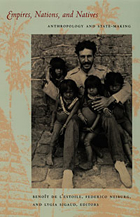
The contributors—social and cultural anthropologists from the Americas and Europe—report on both historical and contemporary processes. Moving beyond controversies that cast the relationship between scholarship and politics in binary terms of complicity or autonomy, they bring into focus a dynamic process in which states, anthropological knowledge, and population groups themselves are mutually constructed. Such a reflexive endeavor is an essential contribution to a critical anthropological understanding of a changing world.
Contributors: Alban Bensa, Marcio Goldman, Adam Kuper, Benoît de L’Estoile, Claudio Lomnitz, David Mills, Federico Neiburg, João Pacheco de Oliveira, Jorge Pantaleón, Omar Ribeiro Thomaz, Lygia Sigaud, Antonio Carlos de Souza Lima, Florence Weber
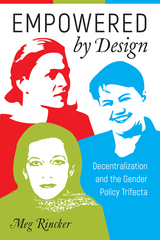
In her probing book, Empowered by Design, Meg Rincker asks, Under what conditions will decentralization lead to women’s empowerment in countries around the globe? Using three case studies—the United Kingdom, Poland, and Pakistan—she shows how decentralization reforms create new institutional offices as power shifts from the national level to a meso-tier level, which is located between the national government and local municipalities. These shifts impact a country’s political, administrative, and fiscal reforms as well as women’s representation.
Rincker argues that this shift should be inclusive of women—or at least lead more women to participate in institutions—but this is not always the case. She indicates that three conditions, “the gender policy trifecta,” need to be met to achieve this: legislative gender quotas, women’s policy agencies, and gender-responsive budgeting at the level of governance in question. Rincker's innovative research uses original comparative data about what women want, quantitative cross-national analyses, and interviews with women’s organization leaders and politicians to show how cross-institutional policymaking can empower women.
Rincker’s fine-grained analysis makes a significant contribution to the study of representation and gendered implications of decentralization, as well as how representatives go about understanding and aggregating our diverse policy preferences.
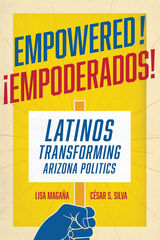
Empowered!examines Arizona’s recent political history and how it has been shaped and propelled by Latinos. It also provides a distilled reflection of U.S. politics more broadly, where the politics of exclusion and the desire for inclusion are forces of change.
Lisa Magaña and César S. Silva argue that the state of Arizona is more inclusive and progressive then it has ever been. Following in the footsteps of grassroots organizers in California and the southeastern states, Latinos in Arizona have struggled and succeeded to alter the anti-immigrant and racist policies that have been affecting Latinos in the state for many years. Draconian immigration policies have plagued Arizona’s political history. Empowered! shows innovative ways that Latinos have fought these policies.
Empowered! focuses on the legacy of Latino activism within politics. It raises important arguments about those who stand to profit financially and politically by stoking fear of immigrants and how resilient politicians and grassroots organizers have worked to counteract that fear mongering. Recognizing the long history of disenfranchisement and injustice surrounding minority communities in the United States, this book outlines the struggle to make Arizona a more just and equal place for Latinos to live.
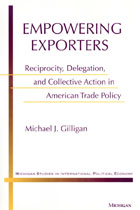


America’s cities are increasingly acknowledged as sites of renewal and economic opportunity—but how can city leaders facing physical and financial constraints harness this positive energy to create sustainable development? The story of Cleveland in the early 1980s provides the necessary roadmap. Mayor George V. Voinovich, by drawing on the combined strengths of the public and private sectors, took Cleveland from financial default to becoming “America’s Comeback City,” and he later used the best practices he developed there to tackle state-level challenges as governor of Ohio. The public-private partnership model that Voinovich pioneered has since become the gold standard for cities seeking to maximize resources.
Using lessons from Cleveland, Voinovich developed this handbook for governments and private entities seeking a mutually enriching partnership. It is his legacy to those who will guide America’s cities to new growth and vitality.
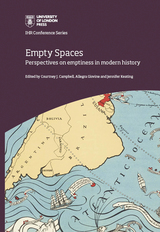
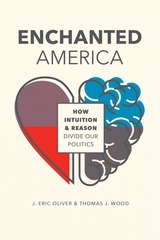
The answer, according to J. Eric Oliver and Thomas J. Wood, can be found in the most important force shaping American politics today: human intuition. Much of what seems to be irrational in American politics arises from the growing divide in how its citizens make sense of the world. On one side are rationalists. They use science and reason to understand reality. On the other side are intuitionists. They rely on gut feelings and instincts as their guide to the world. Intuitionists believe in ghosts and End Times prophecies. They embrace conspiracy theories, disbelieve experts, and distrust the media. They are stridently nationalistic and deeply authoritarian in their outlook. And they are the most enthusiastic supporters of Donald Trump. The primary reason why Trump captured the presidency was that he spoke about politics in a way that resonated with how Intuitionists perceive the world. The Intuitionist divide has also become a threat to the American way of life. A generation ago, intuitionists were dispersed across the political spectrum, when most Americans believed in both God and science. Today, intuitionism is ideologically tilted toward the political right. Modern conservatism has become an Intuitionist movement, defined by conspiracy theories, strident nationalism, and hostility to basic civic norms.
Enchanted America is a clarion call to rationalists of all political persuasions to reach beyond the minority and speak to intuitionists in a way they understand. The values and principles that define American democracy are at stake.
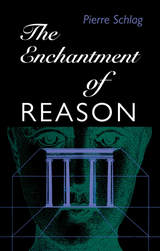
In examining the fierce resistance to questioning reason’s primacy, this renowned critic and professor of American law demonstrates how those who use and study the law perpetuate their own methodological blind spots. Claiming that reason has been endowed with a virtually mystical power to organize social life, Schlag unravels the seemingly rational world of judicial opinions, statutes, doctrines, and legal principles. In the process, he paints a shocking—and sure to be controversial—picture of the chaos and, indeed, violence of the American legal tradition.
This bold commentary on the irrationality of reason in American law and legal studies will interest not only legal scholars and philosophers but also serious thinkers across a broad disciplinary spectrum.
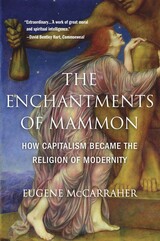
“An extraordinary work of intellectual history as well as a scholarly tour de force, a bracing polemic, and a work of Christian prophecy…McCarraher challenges more than 200 years of post-Enlightenment assumptions about the way we live and work.”
—The Observer
At least since Max Weber, capitalism has been understood as part of the “disenchantment” of the world, stripping material objects and social relations of their mystery and magic. In this magisterial work, Eugene McCarraher challenges this conventional view. Capitalism, he argues, is full of sacrament, whether one is prepared to acknowledge it or not. First flowering in the fields and factories of England and brought to America by Puritans and evangelicals, whose doctrine made ample room for industry and profit, capitalism has become so thoroughly enmeshed in the fabric of our society that our faith in “the market” has become sacrosanct.
Informed by cultural history and theology as well as management theory, The Enchantments of Mammon looks to nineteenth-century Romantics, whose vision of labor combined reason, creativity, and mutual aid, for salvation. In this impassioned challenge to some of our most firmly held assumptions, McCarraher argues that capitalism has hijacked our intrinsic longing for divinity—and urges us to break its hold on our souls.
“A majestic achievement…It is a work of great moral and spiritual intelligence, and one that invites contemplation about things we can’t afford not to care about deeply.”
—Commonweal
“More brilliant, more capacious, and more entertaining, page by page, than his most ardent fans dared hope. The magnitude of his accomplishment—an account of American capitalism as a religion…will stun even skeptical readers.”
—Christian Century
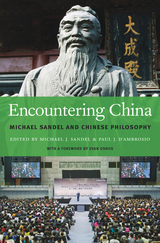
In the West, Harvard philosopher Michael Sandel is a thinker of unusual prominence. In China, he’s a phenomenon, greeted by vast crowds. China Daily reports that he has acquired a popularity “usually reserved for Hollywood movie stars.” China Newsweek declared him the “most influential foreign figure” of the year. In Sandel the Chinese have found a guide through the ethical dilemmas created by the nation’s swift embrace of a market economy—a guide whose communitarian ideas resonate with aspects of China’s own rich and ancient philosophical traditions.
Chinese citizens often describe a sense that, in sprinting ahead, they have bounded past whatever barriers once held back the forces of corruption and moral disregard. The market economy has lifted millions from poverty but done little to define ultimate goals for individuals or the nation. Is the market all there is? In this context, Sandel’s charismatic, interactive lecturing style, which roots moral philosophy in real-world scenarios, has found an audience struggling with questions of their responsibility to one another.
Encountering China brings together leading experts in Confucian and Daoist thought to explore the connections and tensions revealed in this unlikely episode of Chinese engagement with the West. The result is a profound examination of diverse ideas about the self, justice, community, gender, and public good. With a foreword by Evan Osnos that considers Sandel’s fame and the state of moral dialogue in China, the book will itself be a major contribution to the debates that Sandel sparks in East and West alike.
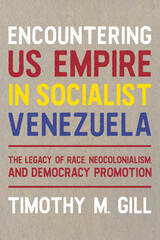
Since the end of World War II, the United States has come to dominate the world economically and politically, leading many to describe the United States as an empire. Scholars have analyzed how the US government has worked through international financial institutions, its Central Intelligence Agency, and outright warfare to achieve its will. In this book, Timothy M. Gill spotlights how the US government also worked through democracy promotion to undermine governments abroad, including in Venezuela. President Hugo Chávez, who ruled from 1999 until his death in 2013, was among the democratically elected Latin American state leaders who embraced socialism and challenged the idea of US global power. Gill shows how US government agencies funded and trained opposition parties and activists, and how such intervention often was justified in neocolonial and racist terms. Through analysis of documents obtained through Freedom of Information Act requests, embassy cables, and interviews with US government and Venezuelan nonprofit members, Gill details such operations and the imperial thinking behind them.


Winner of the Outstanding Publication Award, Section on Aging and the Life Course, American Sociological Association
Senior citizens from all walks of life face a gauntlet of physical, psychological, and social hurdles. But do the disadvantages some people accumulate over the course of their lives make their final years especially difficult? Or does the quality of life among poor and affluent seniors converge at some point? The End Game investigates whether persistent socioeconomic, racial, and gender divisions in America create inequalities that structure the lives of the elderly.
“Avoiding reductionist frameworks and showing the hugely varying lifestyles of Californian seniors, The End Game poses a profound question: how can provision of services for the elderly cater for individual circumstances and not merely treat the aged as one grey block? Abramson eloquently and comprehensively expounds this complex question.”
—Michael Warren, LSE Review of Books
“The author’s approach situates inequality experienced by older Americans in a real world context and links culture, social life, biological life, and structural disparities in ways that allow readers to understand the intersectionality of diversity imbued in the lives of older Americans…Abramson opens a window into the reality of old age, the importance of culture and the impact it has on shared/prior experiences, and the inequalities that structure them.”
—A. L. Lewis, Choice
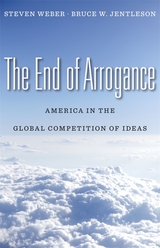
Free-market capitalism, hegemony, Western culture, peace, and democracy—the ideas that shaped world politics in the twentieth century and underpinned American foreign policy—have lost a good deal of their strength. Authority is now more contested and power more diffuse. Hegemony (benign or otherwise) is no longer a choice, not for the United States, for China, or for anyone else.
Steven Weber and Bruce Jentleson are not declinists, but they argue that the United States must take a different stance toward the rest of the world in this, the twenty-first century. Now that we can’t dominate others, we must rely on strategy, making trade-offs and focusing our efforts. And they do not mean military strategy, such as “the global war on terror.” Rather, we must compete in the global marketplace of ideas—with state-directed capitalism, with charismatic authoritarian leaders, with jihadism. In politics, ideas and influence are now critical currency.
At the core of our efforts must be a new conception of the world order based on mutuality, and of a just society that inspires and embraces people around the world.

The Trump administration's war on asylum and what Congress and the Biden administration can do about it
Donald Trump’s 2016 campaign centered around immigration issues such as his promise to build a border wall separating the US and Mexico. While he never built a physical wall, he did erect a legal one. Over the past three years, the Trump administration has put forth regulations, policies, and practices all designed to end opportunities for asylum seekers. If left unchecked, these policies will effectually lead to the end of asylum, turning the United States—once a global leader in refugee aid—into a country with one of the most restrictive asylum systems.
In The End of Asylum, three experts in immigration law offer a comprehensive examination of the rise and demise of the US asylum system. Beginning with the Refugee Act of 1980, they describe how Congress adopted a definition of refugee based on the UN Refugee Convention and prescribed equitable and transparent procedures for a uniform asylum process. The authors then chart the evolution of this process, showing how Republican and Democratic administrations and Congresses tweaked the asylum system but maintained it as a means of protecting victims of persecution—until the Trump administration. By expanding his executive reach, twisting obscure provisions in the law, undermining past precedents, and creating additional obstacles for asylum seekers, Trump’s policies have effectively ended asylum. The book concludes with a roadmap and a call to action for the Biden administration and Congress to repair and reform the US asylum system.
This eye-opening work reveals the extent to which the Trump administration has dismantled fundamental American ideals of freedom from persecution and shows us what we can do about it.
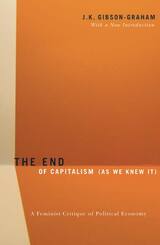
“Paralyzing problems are banished by this dazzlingly lucid, creative, and practical rethinking of class and economic transformation.” —Meaghan Morris, Lingnan University, Hong Kong
“Profoundly imaginative.” —Eve Kosofsky Sedgwick, City University of New York “Filled with insights, it is clearly written and well supported with good examples of actual, deconstructive practices.” —International Journal of Urban and Regional Research
J. K. Gibson-Graham is the pen name of Katherine Gibson and Julie Graham, feminist economic geographers who work, respectively, at the Australian National University in Canberra and the University of Massachusetts Amherst.

In TheEnd of Equality, renowned feminist Beatrix Campbell argues that even as the patriarchy has lost some of its legitimacy, new inequalities are emerging in our culture. We are living, Campbell writes, in an era of neo-patriarchy in which violence has proliferated; body anxiety and self-hatred have flourished; rape is committed with impunity; sex trafficking thrives, and the struggle for equal pay is at an end. After four decades observing society, Campbell still speaks of the long-sought goal of gender equality. But now she calls for a new revolution.

Named by the Times Literary Supplement as one of the 100 most influential books since the end of World War II, The End of Ideology has been a landmark in American social thought, regarded as a classic since its first publication in 1962.
Daniel Bell postulated that the older humanistic ideologies derived from the nineteenth and early twentieth centuries were exhausted, and that new parochial ideologies would arise. In a new introduction to the year 2000 edition, he argues that with the end of communism, we are seeing a resumption of history, a lifting of the heavy ideological blanket and the return of traditional ethnic and religious conflicts in the many regions of the former socialist states and elsewhere.

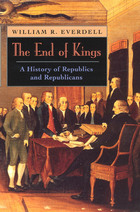
"[An] energetic, aphoristic, wide-ranging book."—Marcus Cunliffe, Washington Post Book World
"Ambitious in conception and presented in a clear and sprightly prose. . . . [This] excellent study . . . is the best statement of the republican faith since Alphonse Aulard's essays almost a century ago." —Choice
"A book which ought to be in the hand of every American who agrees with Benjamin Franklin that the Founding Fathers gave us a Republic and hoped that we would be able to keep it."-Sam J. Ervin, Jr.
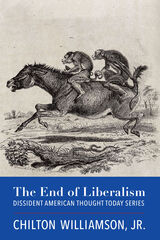
Williamson observes that this liberalism to nevertheless be collapsing, given the obvious opposition to the idea that it is essential to modernity. Liberalism is ironically a kind of unyielding control, "a relativist persuasion that discourages and resists fixed beliefs and certainties and the idea of truth itself." Williamson offers commentary on the present state of liberal ideas and their crimes against better judgment, and vindicates conservatism from being labeled reactionary. Liberalism is exposed as a faith we cannot accept, for it contains nothing to be believed and what it says about the order of things is pure fiction.

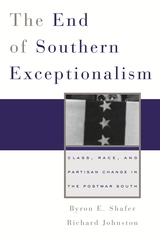
The transformation of Southern politics after World War II changed the political life not just of this distinctive region, but of the entire nation. Until now, the critical shift in Southern political allegiance from Democratic to Republican has been explained, by scholars and journalists, as a white backlash to the civil rights revolution.
In this myth-shattering book, Byron Shafer and Richard Johnston refute that view, one stretching all the way back to V. O. Key in his classic book Southern Politics. The true story is instead one of dramatic class reversal, beginning in the 1950s and pulling everything else in its wake. Where once the poor voted Republican and the rich Democrat, that pattern reversed, as economic development became the engine of Republican gains. Racial desegregation, never far from the heart of the story, often applied the brakes to these gains rather than fueling them.
A book that is bound to shake up the study of Southern politics, this will also become required reading for pundits and political strategists, for all those who argue over what it takes to carry the South.

During the Cold War, many believed that the superpowers shared a conception of strategic stability, a coexistence where both sides would compete for global influence but would be deterred from using nuclear weapons. In actuality, both sides understood strategic stability and deterrence quite differently. Today’s international system is further complicated by more nuclear powers, regional rivalries, and nonstate actors who punch above their weight, but the United States and other nuclear powers still cling to old conceptions of strategic stability.
The purpose of this book is to unpack and examine how different states in different regions view strategic stability, the use or non-use of nuclear weapons, and whether or not strategic stability is still a prevailing concept. The contributors to this volume explore policies of current and potential nuclear powers including the United States, Russia, China, India, Iran, Israel, Pakistan, and Saudi Arabia. This volume makes an important contribution toward understanding how nuclear weapons will impact the international system in the twenty-first century and will be useful to students, scholars, and practitioners of nuclear weapons policy.
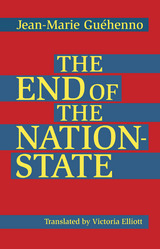
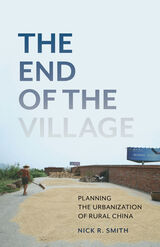
How China’s expansive new era of urbanization threatens to undermine the foundations of rural life
Since the beginning of the twenty-first century, China has vastly expanded its urbanization processes in an effort to reduce the inequalities between urban and rural areas. Centered on the mountainous region of Chongqing, which serves as an experimental site for the country’s new urban development policies, The End of the Village analyzes the radical expansion of urbanization and its consequences for China’s villagers. It reveals a fundamental rewriting of the nation’s social contract, as villages that once organized rural life and guaranteed rural livelihoods are replaced by an increasingly urbanized landscape dominated by state institutions.
Throughout this comprehensive study of China’s “urban–rural coordination” policy, Nick R. Smith traces the diminishing autonomy of the country’s rural populations and their subordination to larger urban networks and shared administrative structures. Outside Chongqing’s urban centers, competing forces are at work in reshaping the social, political, and spatial organization of its villages. While municipal planners and policy makers seek to extend state power structures beyond the boundaries of the city, village leaders and inhabitants try to maintain control over their communities’ uncertain futures through strategies such as collectivization, shareholding, real estate development, and migration.
As China seeks to rectify the development crises of previous decades through rapid urban growth, such drastic transformations threaten to displace existing ways of life for more than 600 million residents. Offering an unprecedented look at the country’s contentious shift in urban planning and policy, The End of the Village exposes the precarious future of rural life in China and suggests a critical reappraisal of how we think about urbanization.


When the term “ageism” was coined in 1969, many problems of exclusion seemed resolved by government programs like Social Security and Medicare. As people live longer lives, today’s great demotions of older people cut deeper into their self-worth and human relations, beyond the reach of law or public policy. In Ending Ageism, or How Not to Shoot Old People, award-winning writer and cultural critic Margaret Morganroth Gullette confronts the offenders: the ways people aging past midlife are portrayed in the media, by adult offspring; the esthetics and politics of representation in photography, film, and theater; and the incitement to commit suicide for those with early signs of “dementia.”
In this original and important book, Gullette presents evidence of pervasive age-related assaults in contemporary societies and their chronic affects. The sudden onset of age-related shaming can occur anywhere—the shove in the street, the cold shoulder at the party, the deaf ear at the meeting, the shut-out by the personnel office or the obtuseness of a government. Turning intimate suffering into public grievances, Ending Ageism, Or How Not to Shoot Old People effectively and beautifully argues that overcoming ageism is the next imperative social movement of our time.
About the cover image:
This elegant, dignified figure--Leda Machado, a Cuban old enough to have seen the Revolution--once the center of a vast photo mural, is now a fragment on a ruined wall. Ageism tears down the structures that all humans need to age well; to end it, a symbol of resilience offers us all brisk blue-sky energy.
“Leda Antonia Machado” from “Wrinkles of the City, 2012.”
Piotr Trybalski / Trybalski.com. Courtesy of the artist.
A Declaration of Grievances
"A Declaration of Grievances" was written by Margaret Morganroth Gullette and is excerpted from her book Ending Ageism, or How Not to Shoot Old People (2017, Rutgers University Press). The poster was designed by Carolyn Kerchof.
- A Declaration of Grievances (in English): https://d3tto5i5w9ogdd.cloudfront.net/wp-content/uploads/2023/01/15175130/A-Declaration-of-Grievances_Eng.pdf
- A Declaration of Grievances (in Spanish): https://d3tto5i5w9ogdd.cloudfront.net/wp-content/uploads/2023/01/15175131/A-Declaration-of-Grievances_Spanish.pdf
- A Declaration of Grievances (in French): https://d3tto5i5w9ogdd.cloudfront.net/wp-content/uploads/2023/01/15175130/A-Declaration-of-Grievances_French.pdf
- A Declaration of Grievances (in German): https://d3tto5i5w9ogdd.cloudfront.net/wp-content/uploads/2023/01/15175131/A-Declaration-of-Grievances_German.pdf
Print the PDF (make sure to click "fit to page") and hang the Declaration up in your home or place of work. Please share this link with other people you know who care about the rights of older persons. Share on social media with the hashtags #ADeclarationOfGrievances and #EndingAgeismGullette.
For more information, an excerpt, links to reviews, and special offers on this book, go to: https://www.rutgersuniversitypress.org/ending-ageism
Related website: (https://www.brandeis.edu/wsrc/scholars/profiles/gullette.html)

Hannah E. Britton examines the reasons gendered violence persists in relationship to social inequalities even after women assume political power. Venturing into South African communities, Britton invites service providers, religious and traditional leaders, police officers, and medical professionals to address gender-based violence in their own words. Britton finds the recent turn toward carceral solutions—with a focus on arrests and prosecutions—fails to address the complexities of the problem and looks at how changing specific community dynamics can defuse interpersonal violence. She also examines how place and space affect the implementation of policy and suggests practical ways policymakers can support street level workers.
Clear-eyed and revealing, Ending Gender-Based Violence offers needed tools for breaking cycles of brutality and inequality around the world.


As Brazil, Russia, India, China, and the European Union now rise in global influence, twenty leading historians from four continents take a timely look backward and forward to discover patterns of eclipse in past empires that are already shaping a decline in U.S. global power, including:
• erosion of economic and fiscal strength needed for military power on a global scale
• misuse of military power through micro-military misadventures
• breakdown of alliances among major powers
• weakened controls over the subordinate elites critical for any empire’s exercise of global power
• insufficient technological innovation to sustain global force projection.

Gregory Elliott argues that Marx is central to all three accounts and that, along with the Manifesto, they form a quartet of analyses of the results and prospects of capitalism and socialism, which are of enduring significance for the Left.
Senses of an Ending provides a readable survey of key historical and political thinkers that will appeal to anyone interested in modern political thought.
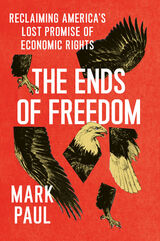
Since the Founding, Americans have debated the true meaning of freedom. For some, freedom meant the provision of life’s necessities, those basic conditions for the “pursuit of happiness.” For others, freedom meant the civil and political rights enumerated in the Bill of Rights and unfettered access to the marketplace—nothing more. As Mark Paul explains, the latter interpretation—thanks in large part to a particularly influential cadre of economists—has all but won out among policymakers, with dire repercussions for American society: rampant inequality, endemic poverty, and an economy built to benefit the few at the expense of the many.
In this book, Paul shows how economic rights—rights to necessities like housing, employment, and health care—have been a part of the American conversation since the Revolutionary War and were a cornerstone of both the New Deal and the Civil Rights Movement. Their recuperation, he argues, would at long last make good on the promise of America’s founding documents. By drawing on FDR’s proposed Economic Bill of Rights, Paul outlines a comprehensive policy program to achieve a more capacious and enduring version of American freedom. Among the rights he enumerates are the right to a good job, the right to an education, the right to banking and financial services, and the right to a healthy environment.
Replete with discussions of some of today’s most influential policy ideas—from Medicare for All to a federal job guarantee to the Green New Deal—The Ends of Freedom is a timely and urgent call to reclaim the idea of freedom from its captors on the political right—to ground America’s next era in the country’s progressive history and carve a path toward a more economically dynamic and equitable nation.
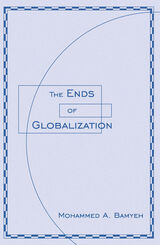
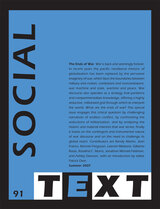
The contributors to this special issue—drawing on cultural studies, anthropology, economics, psychoanalysis, gender studies, postcolonial studies, and war literature—target the blind spots in current debates about war. One essay examines the financing of war, challenging the myth that our military-industrial complex generates economic bounty. Another contributor addresses strategies of high-tech urban warfare now being developed by the U.S. military and warns of the historical limits of colonial policing techniques that build on practices of surveillance. Other essays discuss the eroticization of “consent” embodied in the practice of torture at Abu Ghraib; the paradoxes of paramilitary policing and popular resistance along the militarized Mexico-U.S. border; and the continuities between the permanent war economy that emerged in the United States during World War II and the current disastrous confluence of militarism, global outsourcing, and economic depletion.
Contributors. Ashley Dawson, Patrick Deer, Jonathan Michael Feldman, Kennan Ferguson, Jean Franco, Randy Martin, Leerom Medovoi, Rosalind C. Morris, Gilberto Rosas
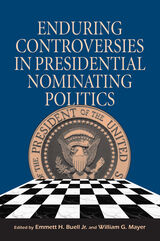
Enduring Controversies in Presidential Nominating Politics retraces the more than two hundred-year history of presidential elections in the United States to provide a primer on how the process has evolved from the days of the founders, through the heyday of nominating conventions, to today’s overwhelming interest in early primaries.
Original essays by the editors introduce, critique, and occasionally even refute a wide variety of historical readings including Alexander Hamilton’s defense of election procedures, excerpts of individual states’ nominations of candidates in 1824, an overview of the impact television has had on nominating conventions, and calls for a national rotating primary scheme in 2004. As a whole, the collection reveals the common threads that run through the history of the nominating process, and points out that today’s litany of complaints is not at all new.
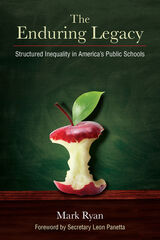
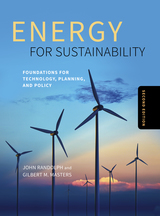
The most comprehensive book on this topic, Energy for Sustainability has been the go-to resource for courses. This new edition has been thoroughly revised and updated to inform and guide students and practitioners who will steer this transformation.
Drawing on a combined 80 years of teaching experience, John Randolph and Gilbert Masters take a holistic and interdisciplinary approach. Energy for Sustainability can help techies and policymakers alike understand the mechanisms required to enable conversion to energy that is clean, affordable, and secure. Major revisions to this edition reflect the current changes in technology and energy use and focus on new analyses, data, and methods necessary to understand and actively participate in the transition to sustainable energy.
The book begins with energy literacy, including patterns and trends, before covering the fundamentals of energy related to physics, engineering, and economics. The next parts explore energy technologies and opportunities in three important energy sectors: buildings, electricity, and transportation. The final section focuses on policy and planning, presenting the critical role of public policy and consumer and investor choice in transforming energy markets to greater sustainability. Throughout the book, methods for energy and economic analysis and design give readers a quantitative appreciation for and understanding of energy systems. The book uses case studies extensively to demonstrate current experience and illustrate possibilities.
Students will gain an understanding of what it takes to achieve clean, affordable, sustainable energy. Supplemental materials are available at www.islandpress.org/energy

Mogens Rüdiger and Anna Åberg present a concise and timely history of energy production, trade, and consumption in Norden, starting with a review of the regional energy mix—from wind, solar, tide and wave, geothermal, biomass, nuclear, coal, and gas sources. Brief chapters describe the diversity of Nordic energy markets, assess how far the green transition has come, and explore what comes next as global crises, domestic politics, and technological developments present novel challenges and opportunities. Energy infrastructures and economic activities, Rüdiger and Åberg argue, serve as unique cultural focal points in the region. The coauthors summarize the national policy frameworks for the sector as well as the key energy and economic indicators used in infrastructure planning, regulation, and the opening of the electricity and gas markets to free competition.
Energy in the Nordic World is the essential primer to the power markets at the heart of Europe’s energy transition.

Energy can be neither created nor destroyed—but it can be wasted. The United States wastes two-thirds of its energy, including 80 percent of the energy used in transportation. So the nation has a tremendous opportunity to develop a sensible energy policy based on benefits and costs. But to do that we need facts—not hyperbole, not wishful thinking. Mara Prentiss presents and interprets political and technical information from government reports and press releases, as well as fundamental scientific laws, to advance a bold claim: wind and solar power could generate 100 percent of the United States’ average total energy demand for the foreseeable future, even without waste reduction.
To meet the actual rather than the average demand, significant technological and political hurdles must be overcome. Still, a U.S. energy economy based entirely on wind, solar, hydroelectricity, and biofuels is within reach. The transition to renewables will benefit from new technologies that decrease energy consumption without lifestyle sacrifices, including energy optimization from interconnected smart devices and waste reduction from use of LED lights, regenerative brakes, and electric cars. Many countries cannot obtain sufficient renewable energy within their borders, Prentiss notes, but U.S. conversion to a 100 percent renewable energy economy would, by itself, significantly reduce the global impact of fossil fuel consumption.
Enhanced by full-color visualizations of key concepts and data, Energy Revolution answers one of the century’s most crucial questions: How can we get smarter about producing and distributing, using and conserving, energy?
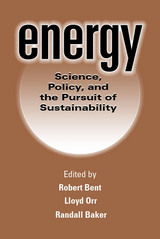
In the early 2000s, energy prices have fluctuated wildly, from historic highs in the winter and spring of 2001 to the lowest wholesale prices in decades a few short months later. As the largest user of fossil-fuel energy, the United States is the key player in the world's energy markets, and our nation's energy policy (or lack thereof) has become a subject of increasing concern.
Energy: Science, Policy, and the Pursuit of Sustainability is an essential primer on energy, society, and the environment. It offers an accessible introduction to the "energy problem" -- its definition, analysis, and policy implications. Current patterns of energy use are without question unsustainable over the long term, and our dependence on fossil fuels raises crucial questions of security and self-sufficiency. This volume addresses those questions by examining the three broad dimensions of the issue: physical, human, and political-economic. Chapters consider:
- the laws of nature and the impacts of energy use on our physical and ecological life-support systems
- the psychological, social, and cultural factors that determine how we use energy
- the role of government actions in adjusting costs, influencing resource consumption, and protecting the environment
- how markets work, and the reasons and cures for market failures in responding to long-term environmental and energy problems

The only published work that treats the historical evolution of EPA enforcement, this book provides a candid inside glimpse of a crucial aspect of the work of an important federal agency. Based on 190 personal interviews with present and former enforcement officials at EPA, the U.S. Department of Justice, and key congressional staff members—along with extensive research among EPA documents and secondary sources—the book vividly recounts the often tumultuous history of EPA’s enforcement program. It also analyzes some important questions regarding EPA’s institutional relationships and the Agency’s working environment.
This revised and updated edition adds substantial new chapters examining EPA enforcement during the Clinton and George W. Bush administrations. Its treatment of issues of civil service decline and the applicability of captive agency theory is also new and original.
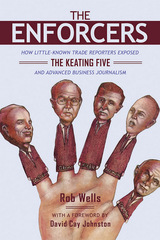
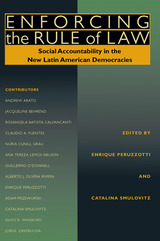
Reports of scandal and corruption have led to the downfall of numerous political leaders in Latin America in recent years. What conditions have developed that allow for the exposure of wrongdoing and the accountability of leaders? Enforcing the Rule of Law examines how elected officials in Latin American democracies have come under scrutiny from new forms of political control, and how these social accountability mechanisms have been successful in counteracting corruption and the limitations of established institutions.
This volume reveals how legal claims, media interventions, civic organizations, citizen committees, electoral observation panels, and other watchdog groups have become effective tools for monitoring political authorities. Their actions have been instrumental in exposing government crime, bringing new issues to the public agenda, and influencing or even reversing policy decisions.
Enforcing the Rule of Law presents compelling accounts of the emergence of civic action movements and their increasing political influence in Latin America, and sheds new light on the state of democracy in the region.

Engaged Urban Pedagogy presents a participatory approach to teaching about the built environment by exploring twelve examples of real-world engagement in urban planning involving people within, and beyond, the university. Starting with curriculum review, course content is analyzed in light of urban pasts, race, queer identity, lived experiences, and the concerns of urban professionals. Case studies then shift to focus on techniques for participatory critical pedagogy, including expanding the classroom with links to live place-making processes, connections made through digital co-design exercises, and student-led podcasting assignments. Finally, the book turns to activities beyond formal university teaching, such as those where school-age children learn about their own participation in urban processes together alongside university students and researchers. Drawing on foundational works of critical pedagogy, the contributors present a distinctly urban praxis that will help those in universities respond to the built environment challenges of today.
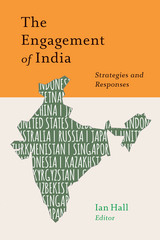
As India emerges as a significant global actor, diverse states have sought to engage India with divergent agendas and interests. Some states aspire to improve their relations with New Delhi, while others pursue the transformation of Indian foreign policy—and even India itself—to suit their interests. The Engagement of India explores the strategies that key states have employed to engage and shape the relationship with a rising and newly vibrant India, their successes and failures, and Indian responses—positive, ambivalent, and sometimes hostile—to engagement. A multinational team of contributors examine the ways in which Australia, China, Japan, Russia, and the United States have each sought to engage India for various purposes, explore the ways in which India has responded, and assess India’s own strategies to engage with Singapore, Vietnam, Indonesia, and the Central Asian republics.
This informative analysis of the foreign relations of a key rising power, and first comparative study of engagement strategies, casts light on the changing nature of Indian foreign policy and the processes that shape its future. The Engagement of India should be of interest to students and scholars of international relations, diplomacy, and South Asia.
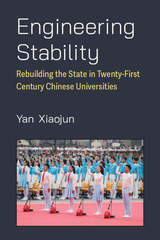
Drawing on rich materials gathered from in-depth field research in China during the Xi Jinping era, Engineering Stability invites scholars of comparative politics, state theory, contentious politics, and political development to rethink and reimagine how what Yan calls “a compromised autocratic state” is rebuilt within and from itself after overcoming a traumatic moment of vulnerability. The book further details the four types of infrastructure — institutional, significative, regulatory, and incentivizing — that state rebuilders need to overhaul, and looks into the campaign of state rebuilding in post-Tiananmen Chinese universities and its implications for our understanding of politics in general.

Engineering the Farm offers a wide-ranging examination of the social and ethical issues surrounding the production and consumption of genetically modified organisms (GMOs), with leading thinkers and activists taking a broad theoretical approach to the subject. Topics covered include:
- the historical roots of the anti-biotechnology movement
- ethical issues involved in introducing genetically altered crops
- questions of patenting and labeling
- the "precautionary principle" and its role in the regulation of GMOs
- effects of genetic modification on the world's food supply
- ecological concerns and impacts on traditional varieties of domesticated crops
- potential health effects of GMOs
Contributors argue that the scope, scale, and size of the present venture in crop modification is so vast and intensive that a thoroughgoing review of agricultural biotechnology must consider its global, moral, cultural, and ecological impacts as well as its effects on individual consumers. Throughout, they argue that more research is needed on genetically modified food and that consumers are entitled to specific information about how food products have been developed.
Despite its increasing role in worldwide food production, little has been written about the broader social and ethical implications of GMOs. Engineering the Farm offers a unique approach to the subject for academics, activists, and policymakers involved with questions of environmental policy, ethics, agriculture, environmental health, and related fields.


England’s Green explores how environmental concerns have shaped and reflected English national identity since the 1960s. From agriculture to leisure, climate change, folklore, archaeology, and religion, David Matless shows how national environmental debates connect to the local, regional, global, and postcolonial worlds. Moving across a breadth of material including government policy, popular music, ecological polemic, and television comedy, England’s Green shows the richness and complexity of English environmental culture. Along the way, Matless tracks how today’s debates over climate and nature, land, and culture, have been molded by events over the past sixty years.
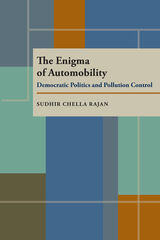

A century ago, as the United States prepared to enter World War I, the military chaplaincy included only mainline Protestants and Catholics. Today it counts Jews, Mormons, Muslims, Christian Scientists, Buddhists, Seventh-day Adventists, Hindus, and evangelicals among its ranks. Enlisting Faith traces the uneven processes through which the military struggled with, encouraged, and regulated religious pluralism over the twentieth century.
Moving from the battlefields of Europe to the jungles of Vietnam and between the forests of Civilian Conservation Corps camps and meetings in government offices, Ronit Y. Stahl reveals how the military borrowed from and battled religion. Just as the state relied on religion to sanction war and sanctify death, so too did religious groups seek recognition as American faiths. At times the state used religion to advance imperial goals. But religious citizens pushed back, challenging the state to uphold constitutional promises and moral standards.
Despite the constitutional separation of church and state, the federal government authorized and managed religion in the military. The chaplaincy demonstrates how state leaders scrambled to handle the nation’s deep religious, racial, and political complexities. While officials debated which clergy could serve, what insignia they would wear, and what religions appeared on dog tags, chaplains led worship for a range of faiths, navigated questions of conscience, struggled with discrimination, and confronted untimely death. Enlisting Faith is a vivid portrayal of religious encounters, state regulation, and the trials of faith—in God and country—experienced by the millions of Americans who fought in and with the armed forces.

Spanning from the beginning of the transnational idea with 1951’s Montanunion—the European Coal and Steel Community—to the current financial crisis, Menasse focuses on the institutional structures and forces both advancing and obstructing the European project. Given the internal tensions among the European Commission, Parliament, and Council, Menasse argues that current problems that are frequently misunderstood as resulting from the financial crisis are, in fact, political. Along the way, he makes the bold claim that either the Europe of nation-states will perish—or the project of transcending the nation-states will.
A provocative book, Enraged Citizens, European Peace and Democratic Deficits deftly analyzes the financial and bureaucratic structures of the European Union and sheds much-needed light on the state of the debt crisis. Menasse brings his considerable literary expertise to the unraveling of the real state of the Union, along the way weaving an intriguing tale of one continent’s efforts to become a truly postnational democracy.
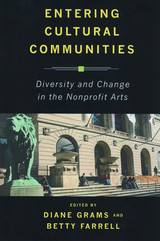
The chapters in this book draw on interviews with leaders, staff, volunteers, and audience members from eighty-five nonprofit cultural organizations to explore how they are trying to increase participation and the extent to which they have been successful. The insiders' accounts point to the opportunities and challenges involved in such efforts, from the reinvention of programs and creation of new activities, to the addition of new departments and staff dynamics, to partnerships with new groups. The authors differentiate between "relational" and "transactional" practices, the former term describing efforts to build connections with local communities and the latter describing efforts to create new consumer markets for cultural products. In both cases, arts leaders report that, although positive results are difficult to measure conclusively, long-term efforts bring better outcomes than short-term activities.
The organizations discussed include large, medium, and small nonprofits located in urban, suburban, and rural areas—from large institutions such as the Smithsonian, the Walker Art Center, the Museum of Fine Arts Houston, and the San Francisco Symphony to many cultural organizations that are smaller, but often known nationally for their innovative work, such as AS220, The Loft Literary Center, Armory Center for the Arts, Appalshop, and the Western Folklife Center.

The Central American region is a vital ecological resource that provides environmental balance for the rest of the American continents. Using comprehensive surveys and statistical studies, this volume presents an evaluation of the region's deforestation, sustainable agriculture, tourism, emerging carbon markets, trade, and growth.
By comparing and contrasting policies applied by other countries with similar environmental characteristics, the contributors argue that Central American governments must learn from the results of these policies in order to manage resources, foster sustainability and competitiveness, and procure positive results.

As the world's largest polluter and its wealthiest country, the United States has a potentially enormous impact on international efforts to protect the environment. In this innovative and thought-provoking book, an international group of scholars examines how U.S. foreign policy affects and is affected by global environmental change.
Covering three broad areas—national security and geopolitics, domestic and international politics, and national interests and international obligations—the contributors examine a host of key issues, including ozone depletion and climate change, biodiversity and whale hunting, environmental and energy security, and international trade. They also raise moral issues associated with the United States's obligations to the rest of humanity. Because the environment has become an ever-more pressing issue at the diplomatic level, this book is essential, timely reading for policymakers, activists, and anyone interested in environmental change and international relations.

Spanning the colonial, postcolonial, and postapartheid eras, these historical and locally specific case studies analyze and engage vernacular, activist, and scholarly efforts to mitigate social-environmental inequity.
This book highlights the ways poor and vulnerable people in South Africa, Lesotho, and Zimbabwe have mobilized against the structural and political forces that deny them a healthy and sustainable environment. Spanning the colonial, postcolonial, and postapartheid eras, these studies engage vernacular, activist, and scholarly efforts to mitigate social-environmental inequity. Some chapters track the genealogies of contemporary activism, while others introduce positions, actors, and thinkers not previously identified with environmental justice. Addressing health, economic opportunity, agricultural policy, and food security, the chapters in this book explore a range of issues and ways of thinking about harm to people and their ecologies.
Because environmental justice is often understood as a contemporary phenomenon framed around North American examples, these fresh case studies will enrich both southern African history and global environmental studies. Environment, Power, and Justice expands conceptions of environmental justice and reveals discourses and dynamics that advance both scholarship and social change.
Contributors:
- Christopher Conz
- Marc Epprecht
- Mary Galvin
- Sarah Ives
- Admire Mseba
- Muchaparara Musemwa
- Matthew A. Schnurr
- Cherryl Walker
READERS
Browse our collection.
PUBLISHERS
See BiblioVault's publisher services.
STUDENT SERVICES
Files for college accessibility offices.
UChicago Accessibility Resources
home | accessibility | search | about | contact us
BiblioVault ® 2001 - 2024
The University of Chicago Press









